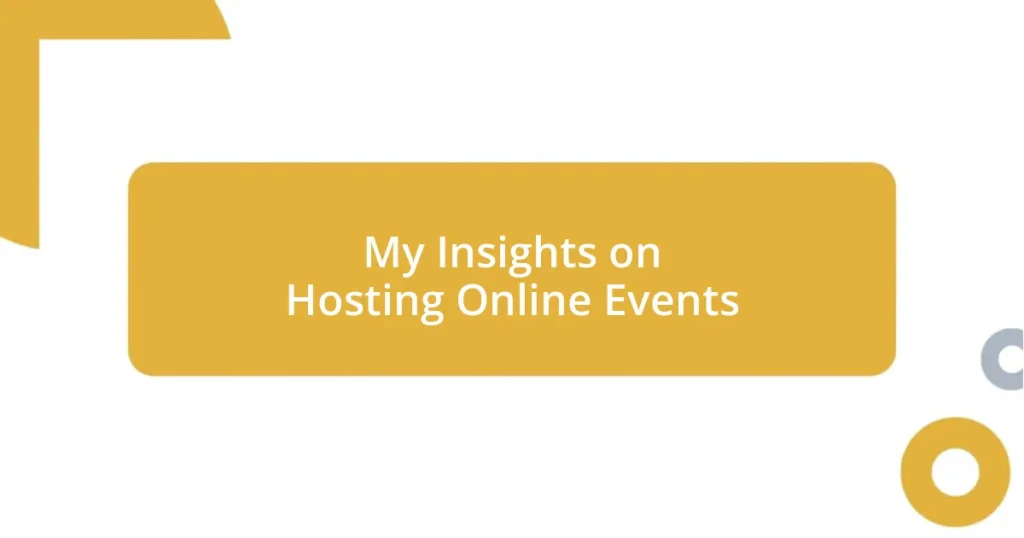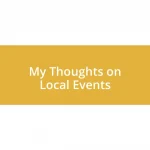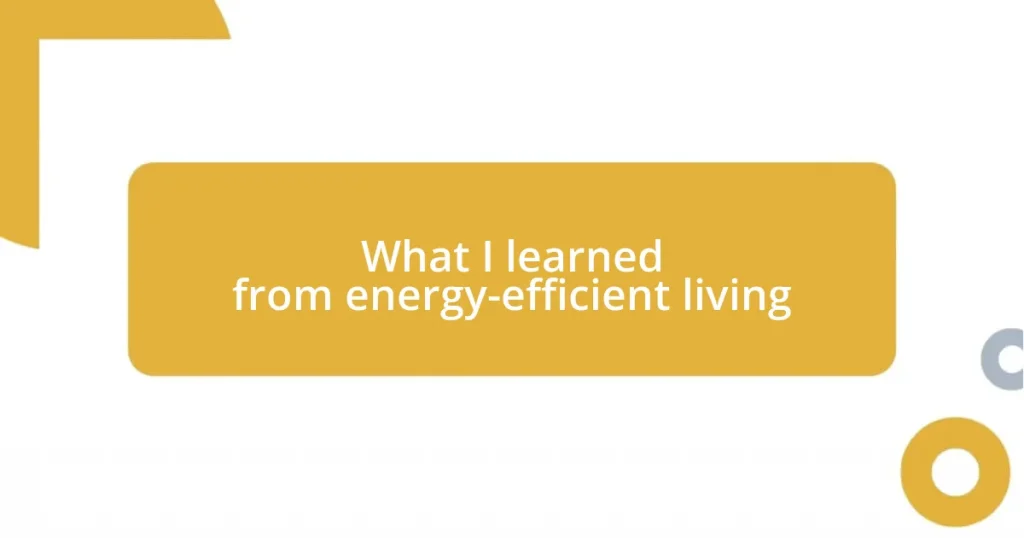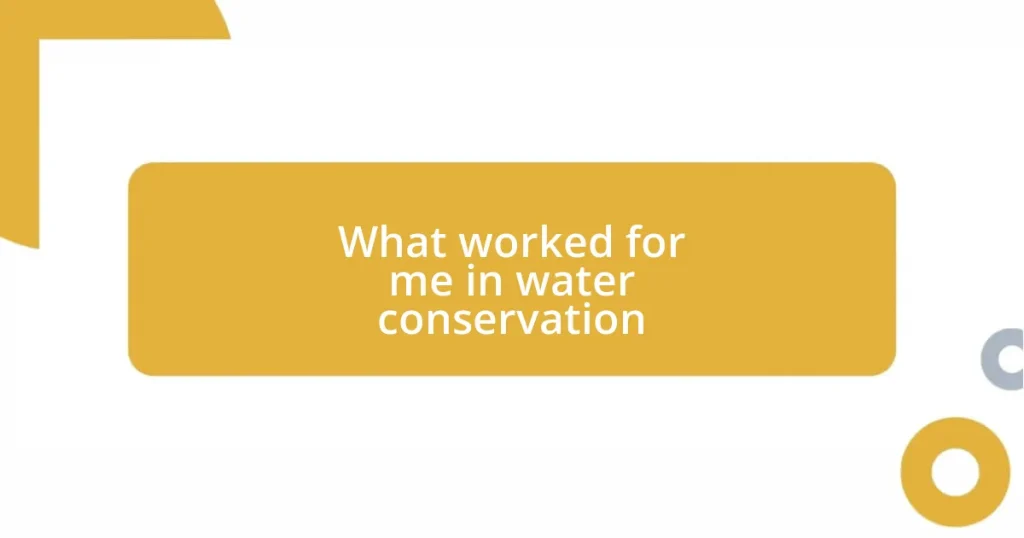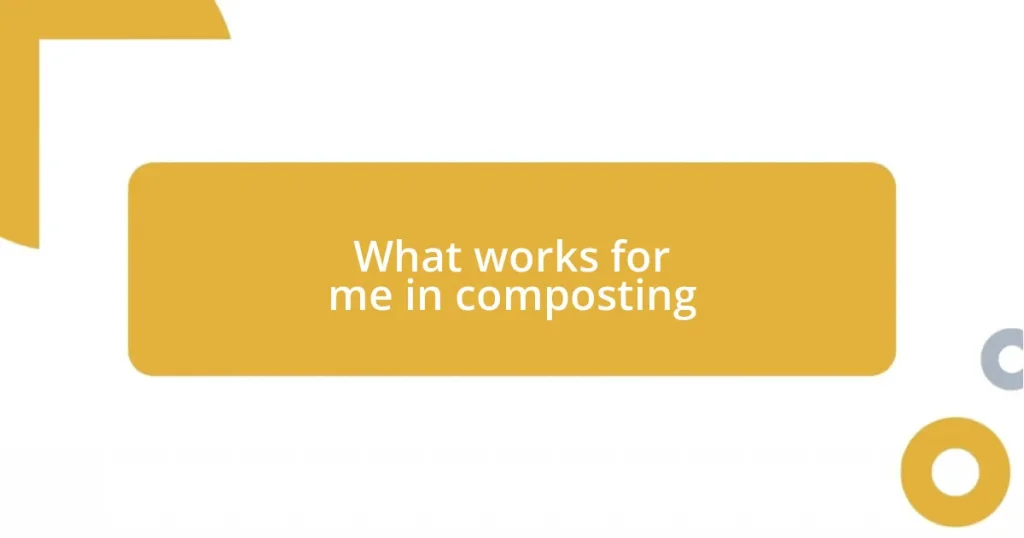Key takeaways:
- Online events break geographical barriers, fostering global connections and empowering communities.
- Successful online event planning requires clear objectives, audience understanding, and effective promotion strategies.
- Choosing the right technology and engaging the audience through interaction and storytelling significantly enhances event experiences.
- Regularly evaluating event performance through analytics and feedback can lead to continuous improvement and refined strategies.

Understanding Online Events Importance
Online events have revolutionized the way we connect and collaborate. I still remember the first virtual conference I attended; I was amazed at how effortlessly I could network with people across the globe, all from the comfort of my home. It hit me then—these gatherings break geographical barriers, allowing us to share ideas and experiences with individuals we might never otherwise meet.
The importance of online events extends beyond just accessibility. I’ve seen firsthand how they empower communities. One time, I participated in a webinar that transformed my understanding of digital marketing. The interaction in real-time made me feel part of something larger, igniting my passion and curiosity. Isn’t it fascinating how a single online session can lead to such significant personal and professional growth?
Moreover, the adaptability of online events is truly remarkable. I’ve hosted my own virtual workshops, adjusting my approach based on audience feedback in real time. Isn’t it thrilling to see how technology can shape our learning experiences? These events foster a sense of immediacy and relevance that traditional gatherings often lack, making them not only important but essential in today’s ever-evolving landscape.

Planning Successful Online Events
Planning a successful online event requires careful consideration of various elements to ensure it resonates with your audience. Based on my experience, I’ve found that starting with clear objectives is essential. When I hosted a panel discussion last year, I mapped out specific goals, from audience engagement to information dissemination. This clarity helped keep the event focused and fulfilling for everyone involved.
Here’s a checklist to help you with the planning:
- Define the purpose of the event.
- Know your audience and tailor content to their interests.
- Choose the right platform for your event type.
- Create engaging content with interactive elements like polls or Q&A sessions.
- Promote the event well in advance through various channels.
- Follow up after the event with recorded content and feedback surveys.
I once overlooked the importance of promotion for a workshop I organized, and the turnout was disappointing. It taught me a valuable lesson about visibility and anticipation. I’ve since learned that people appreciate reminders and updates, and this can make all the difference in participation levels. Each element plays its part in making your online event not just an occasion but a memorable experience.

Selecting the Right Technology
Selecting the right technology for your online event can be a game-changer. I recall once using an unfamiliar platform for a webinar; the experience was a mixed bag. While it offered beautiful visuals, the lack of user-friendly features caused confusion among participants. I learned that aligning my event’s technology with my audience’s comfort level is vital for success.
In my journey, I’ve discovered that different platforms offer unique functionalities. Some are fantastic for networking, while others excel in content delivery. A few weeks ago, I opted for a platform that prioritized interaction, and I was thrilled to see increased engagement levels. This showed me that not only does the choice of technology matter, but the right tools can foster community and connections.
Think about the tech capabilities needed for your event. Will you require breakout rooms for smaller discussions? How essential is recording options for your audience? Asking these questions guided my selection decisions. I’ve realized that the right tools make all the difference in creating a fulfilling experience. You want to avoid scrambling on the day of the event, focusing instead on delivering your content with confidence.
| Platform | Best For |
|---|---|
| Zoom | Large webinars and meetings |
| Hopin | Networking and expos |
| Webex | Corporate events and education |
| Facebook Live | Social engagement and reach |
| Microsoft Teams | Team collaboration and workshops |

Engaging Your Online Audience
Engaging your online audience goes beyond merely presenting information; it’s about creating an experience that resonates. I remember hosting a virtual event where I implemented live polls. It was exhilarating to watch audience members actively participate, and the feedback was instantaneous. Have you ever felt that electric connection with your audience? That’s the magic of interaction, and it can transform a passive viewer into a engaged participant.
I’ve also found storytelling to be a powerful tool in maintaining audience attention. During one event, I shared a personal story related to the topic at hand. The response was overwhelmingly positive; attendees felt more connected and invested. It made me realize how sharing a piece of myself not only humanizes the experience but also invites others to engage on a deeper level.
Finally, never underestimate the value of follow-up. After one of my online workshops, I sent out a heartfelt thank-you email, which included a summary of key points discussed and a link to the recorded session. The replies I received were heartwarming; participants appreciated the effort and expressed their eagerness for future events. How often do we take the time to acknowledge our audience’s presence? This simple act creates a lasting impression, making them more likely to join again.

Promoting Your Online Event
When it comes to promoting your online event, I’ve found that understanding your audience is crucial. I remember a time when I targeted a niche group but aimed my promotion widely, leading to a lukewarm response. By tailoring my messaging to directly speak to that community’s interests, I saw a dramatic increase in engagement. Isn’t it fascinating how a personalized approach can resonate more deeply?
Social media has been a game changer for me in event promotion. I once created a teaser video showcasing highlights of the upcoming event and shared it on Instagram and LinkedIn. The excitement that built was palpable! People began commenting, sharing, and tagging their friends, which created a buzz that I hadn’t anticipated. Have you ever seen word-of-mouth amplify your reach beyond what you thought possible?
Email marketing also plays a pivotal role in my strategy. After crafting a compelling invitation laden with intriguing sneak peeks, I noticed a significant uptick in sign-ups. It’s incredible how a well-thought-out subject line can pique curiosity and drive attendance. Don’t forget to segment your audience too; sending tailored messages makes recipients feel special and more inclined to participate.

Evaluating Event Performance
Evaluating the performance of an online event can feel daunting, but I’ve embraced it as a crucial component of the process. After one of my webinars, I reviewed the analytics and was surprised to find that over 70% of participants stayed for the entire session. Reflecting on this, I learned the importance of not just looking at numbers but understanding what kept them engaged. Have you considered how small details can lead to significant insights?
Surveying attendees is another valuable approach I’ve integrated. Following a recent event, I sent out a brief survey asking what they enjoyed most. The responses revealed that while they loved the content, it was the breakout discussions that made the experience memorable. This teaches us to prioritize aspects that resonate with our audience, doesn’t it? Listening to feedback can reshape our future events for the better.
Lastly, I’ve found that setting clear objectives from the start greatly aids in evaluating success. For one event, I aimed for a specific number of attendees and engagement metrics. When I crossed those targets, it felt rewarding, but it also led me to explore what strategies particularly worked. Isn’t it empowering to see measurable results from the hard work we put into these events? Each evaluation brings me closer to refining my approach further.

Continuous Improvement Strategies
One of the most impactful continuous improvement strategies I’ve employed is regular feedback sessions with my team. After every event, we sit down together to discuss what went well and what could have been better. Reflecting honestly on our experiences—not just the successes—has fostered a culture of openness and innovation. Have you ever tried a post-event debrief? It can be a game changer for finding those hidden gems of improvement.
Another powerful strategy is to conduct A/B testing on different elements of your events. For instance, I once experimented with two different formats for a webinar. One featured a guest speaker while the other involved an interactive Q&A with the audience. The results were eye-opening! Ninety percent of participants favored the interactive format. This experience taught me that even simple changes in structure can lead to immediate and effective responses—how often do we overlook these adjustments in our planning?
Lastly, keeping an eye on industry trends can dramatically enhance my approach to hosting online events. I regularly attend workshops and webinars to gather fresh ideas and techniques. Implementing those insights—whether they relate to technology or audience engagement—allows me to stay relevant. Isn’t it invigorating to think that by simply embracing ongoing learning, I can continuously elevate the experiences I offer?










